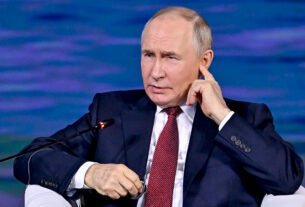Copenhagen, DENMARK – Russia’s latest missile barrage in Kyiv damaged the EU mission’s building and the British Council. The attack sets the stage for this week’s meeting of EU foreign ministers in the Danish capital, where they’re expected to weigh new measures against Moscow, according to an internal paper seen by Euractiv.
The paper outlines options for a tougher sanctions package, including possible secondary steps aimed at undermining Russia’s war effort.
Central elements of the bloc’s forthcoming 19th sanctions package, teased by Brussels for mid-September, include further targeting Russia’s so-called “shadow fleet” of oil tankers – key to sustaining its crude exports – as well as tighter curbs on importing Russian goods.
EU officials have also recently become more open to moving against entities based in China and India, in part due to growing pressure from Washington.
Previous EU sanctions packages already blacklisted an Indian oil refinery and two Chinese banks, but ministers are expected to discuss significantly extending that list, which would mark a sharp turn for a bloc wary of extraterritorial measures.
As of late July, the EU had sanctioned 535 unique oil tankers, according to data by the Kyiv School of Economics.
Ministers are also expected to weigh whether the bloc “should increasingly adopt targeted sanctions against enablers in the shadow fleet ‘eco-system’ [such as] operators, traders, refineries, ports, entities managing shadow fleet vessels, and private operators of international flag registries,” according to the paper.
India – recently courted as a key trade partner amid its tariff stand-off with the US – has come under fire for profiting from cheap Russian crude, with its refineries accused of turning Russian oil into diesel and gasoline for the global market, thereby bolstering Moscow’s war machine.
Some EU member states, including Denmark, would like the discussion to go beyond existing measures and consider activating the EU’s so-called anti-circumvention tool.
Adopted in 2023 but never used, the instrument would let Brussels block exports of sensitive goods to third countries suspected of helping Moscow dodge sanctions.
Its activation could pave the way toward secondary sanctions on companies in third countries, an approach the EU has long been hesitant to embrace.
Raising the stakes for Putin
So far, however, the bloc’s sanctions packages have failed to compel the Kremlin to alter course. EU officials privately admit they are nearing the limits of measures that bite only Moscow.
With US-led peace negotiations stalling amid Russia’s refusal to engage, some EU member states have floated the idea of tying progress in talks directly to tougher sanctions in order to raise pressure on Putin.
One of the guiding questions put forward by the Danish EU presidency for Saturday’s talks is whether to add conditionality to the bloc’s next sanctions package.
While most diplomats see this as unlikely, proponents argue it could be a way to “to keep the packages going”.
Moving on frozen assets
Separate from sanctions is the thorny issue of frozen Russian assets.
While the EU has moved toward using profits from frozen Russian central bank assets to finance Ukraine’s reconstruction, outright seizure remains divisive.
The European Commission has been preparing a range of options to move towards confiscation and plans to present them to member states soon, people familiar with the matter said.
Thursday’s overnight bombardment of Kyiv has revived calls for bolder steps, and some EU diplomats say it could move the needle in this week’s talks.
Commission President Ursula von der Leyen on Thursday floated a renewed push to seize the approximately €300 billion in frozen Russian central bank assets, largely parked in Belgium’s Euroclear clearing house.
France, Germany, and Belgium in particular worry that seizure would undermine confidence in the euro as a reserve currency.
Consecutive Belgian governments have also been deeply hesitant of the idea, fearing a protracted legal battle if Russia challenged the move.
Euroclear itself, while neutral and without decision-making authority, has also voiced caution.
“It will be necessary that any action or agreement avoids undermining confidence in international financial markets by safeguarding the legal order and legal certainty which underpin global economies – such as the principles of sovereign immunity and the protection of ownership rights,” Euroclear told Euractiv in a statement.
“We also believe that any additional risk for Euroclear should be adequately mitigated,” it added.
Europe’s sanctions czar, David O’Sullivan, has urged capitals to make better use of existing tools, warning that enforcement matters as much as new rules, according to diplomats.




